Only through the lens of history can we understand why China fought so hard for a place in the Olympics on its own terms, writes Charles Xu.
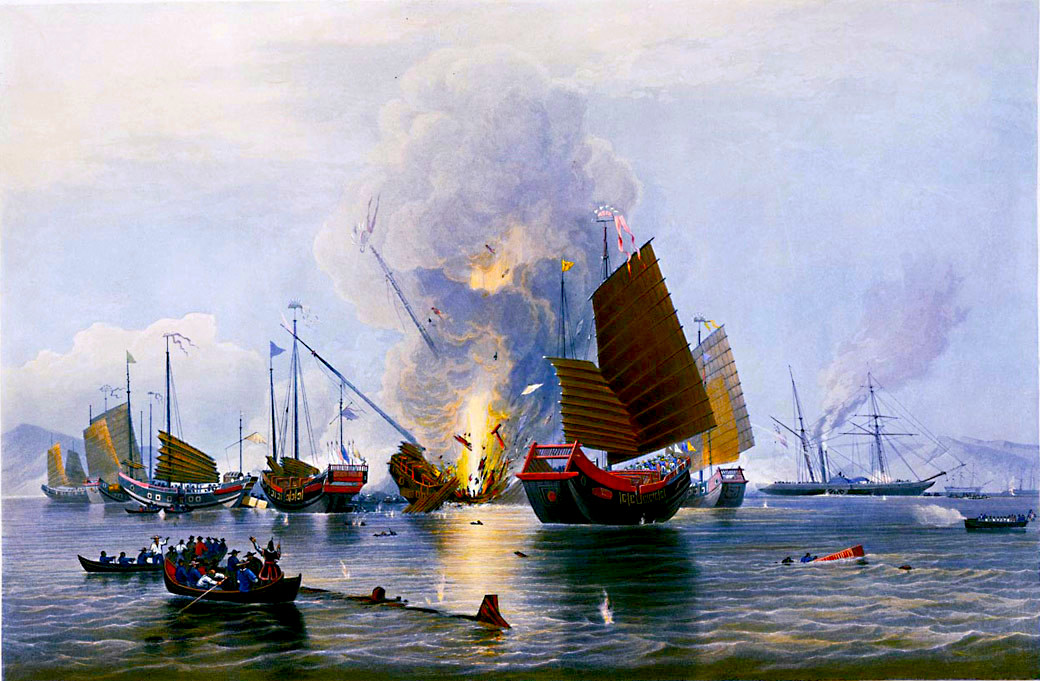
Oil painting by Edward Duncan of a British steamship – The East India Company’s Nemesis, at right — destroying Chinese war junks during the First Opium War, Jan. 7 , 1841. (Wikimedia Commons)
By Charles Xu
Peoples Dispatch
Much has been made of the “diplomatic boycott” by the United States and its allies of the 2022 Beijing Olympics. But what much of the major Western media coverage misses is the historical and geopolitical significance of these games to China — as one of only three Asian host nations for the Olympics (along with Japan and South Korea), and the first Global South country to host the Winter Games. The countries boycotting the 2022 Olympic Games, it seems, see this moment and the history that underpins it as threatening to their global hegemony in both sport and geopolitics.
In 1949, the Communist Party of China decisively prevailed over Chiang Kai-shek’s Kuomintang (KMT) after 22 years of civil war, forcing the latter to flee to Taiwan. The founding of the People’s Republic of China (PRC) brought a definitive end to a “century of humiliation” inaugurated by the First Opium War, which had seen colonial powers reduce China to the “sick man of Asia.” This sickness had been a byword for the weakness, internal rupture, and forced narcotic dependency of the Chinese body politic — transposed inevitably onto the racialized Chinese body.
Overcoming these scars, in all their physical and psychological manifestations, was the guiding principle for sports policy in the PRC. Only through this lens can we understand why it fought in such an obstinate, pugnacious and unabashedly political way for a place in the Olympic movement on its own sovereign terms.
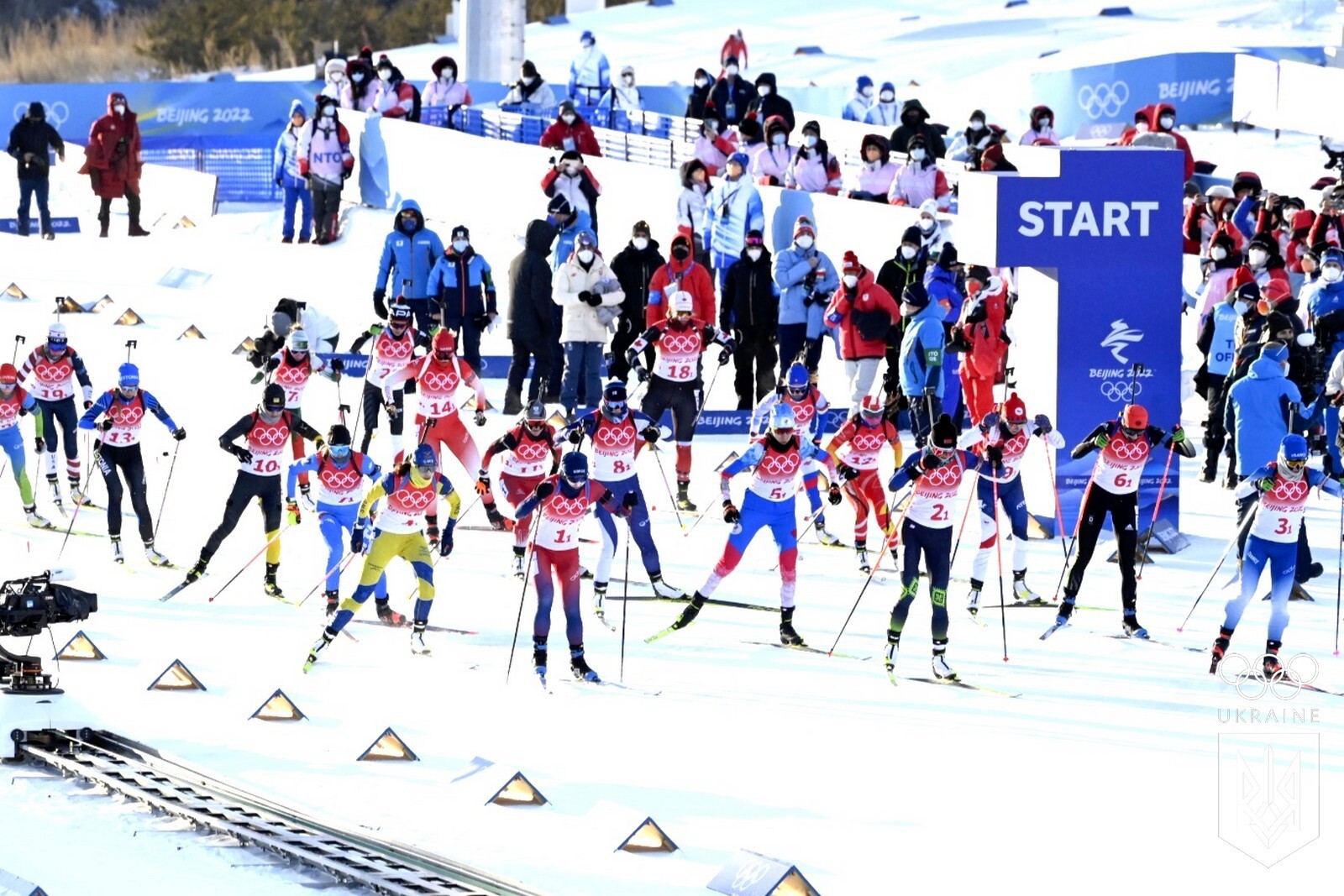
Biathlon at the 2022 Winter Olympics in Beijing – mixed relay start, Feb. 5. (Wikimedia Commons)
China turned the Olympics into a battleground in its contest for legitimacy with the KMT regime on Taiwan and its imperialist backers, elevating the dispute to “the main burden of Olympism,” in the words of Otto Mayer, chancellor of the International Olympic Committee (IOC) from 1946 to 1964. And as with the parallel struggle for recognition by the United Nations, this one ended after three eventful decades in unqualified triumph. University of Hong Kong historian Xu Guoqi relates this fascinating saga in his 2008 book Olympic Dreams: China and Sports, 1895-2008.
The KMT-led Republic of China had sent a solitary athlete to the 1932 Los Angeles Games, followed by larger delegations in 1936 and 1948 — the latter, incredibly, as the KMT was losing the most decisive campaigns of the civil war to the Communists.
After the regime’s flight to Taiwan, its National Olympic Committee (NOC) gave the IOC pro forma notice that it had relocated to Taipei with no further explanation. Throughout this period, the Soviet Union had pointedly snubbed the “bourgeois” IOC in favor of organizing its own proletarian Red Sport International, complete with “Spartakiad” games to rival the Olympics.
1952 Helsinki Games
But by the 1952 Helsinki Games, the Soviets were ready to join the existing Olympic movement in force (ultimately finishing a close second to the United States in the medal count) and duly urged the fledgling PRC to do so as well.
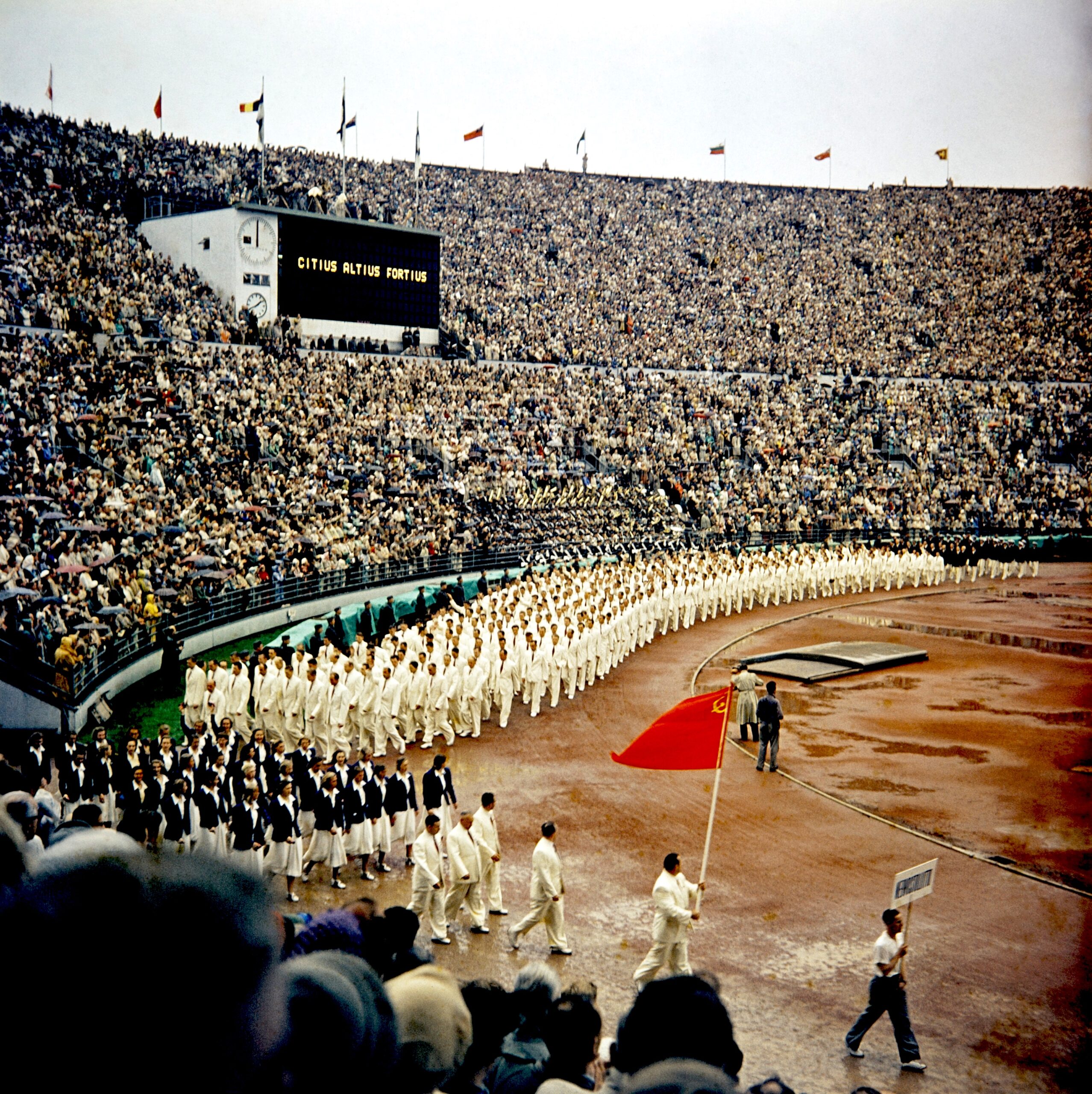
Soviet Union 1952 Olympic team’s entrance to the Helsinki games. (Olympia-kuva Oy, CC BY 4.0, Wikimedia Commons)
From its very first approach, the PRC boldly insisted on what would become known as the one-China policy: that it was the sole legitimate representative of the Chinese nation including KMT-occupied Taiwan. The IOC ultimately fudged on the question and extended a last-minute invitation to Beijing as well as Taipei. Nonetheless, Mao Zedong, Liu Shaoqi, and Zhou Enlai personally approved the decision to send a team, which arrived in Helsinki the day before the closing ceremony and could not take part in any competition.
But merely being there was an unalloyed boon to the PRC’s legitimacy, especially as the rival Taipei-based NOC had withdrawn in protest. Avery Brundage, the notoriously racist American who took over as IOC president that year, complained bitterly that “I did everything in my power to prevent them from taking part. Unfortunately, I had only one vote and because many others present did not feel the same way I was outvoted,” as vocal Olympic critic Jules Boykoff recounts in his 2016 book Power Games: A Political History of the Olympics.
This initial success for the PRC’s efforts to participate in the Olympic movement was not to be repeated. In 1956, it was the PRC’s turn to withdraw in protest as Taipei’s delegation insisted on competing in the Melbourne Summer Games under the name “Republic of China.”
War of Words
Two years later, Chinese IOC delegate Dong Shouyi entered into a bracing war of words with Brundage, calling him “a faithful menial of the U.S. imperialists bent on serving their plot of creating ‘two Chinas’” in a resignation letter that concluded:
“A man like you, who stains the Olympic spirit and violates the Olympic Charter, has no qualification whatsoever to be IOC president. … I feel pained that the IOC is today controlled by an imperialist like you and consequently the Olympic spirit has been grossly trampled upon. To uphold the Olympic spirit and tradition, I hereby declare that I will no longer cooperate with you or have any connection with the IOC while it is under your domination.”
Dong would not be the last Chinese representative to evoke an idealized “Olympic spirit” — in opposition to the Americans, who arguably embodied the real one in all its racist ugliness. He would, however, be the last one on the IOC until 1979.
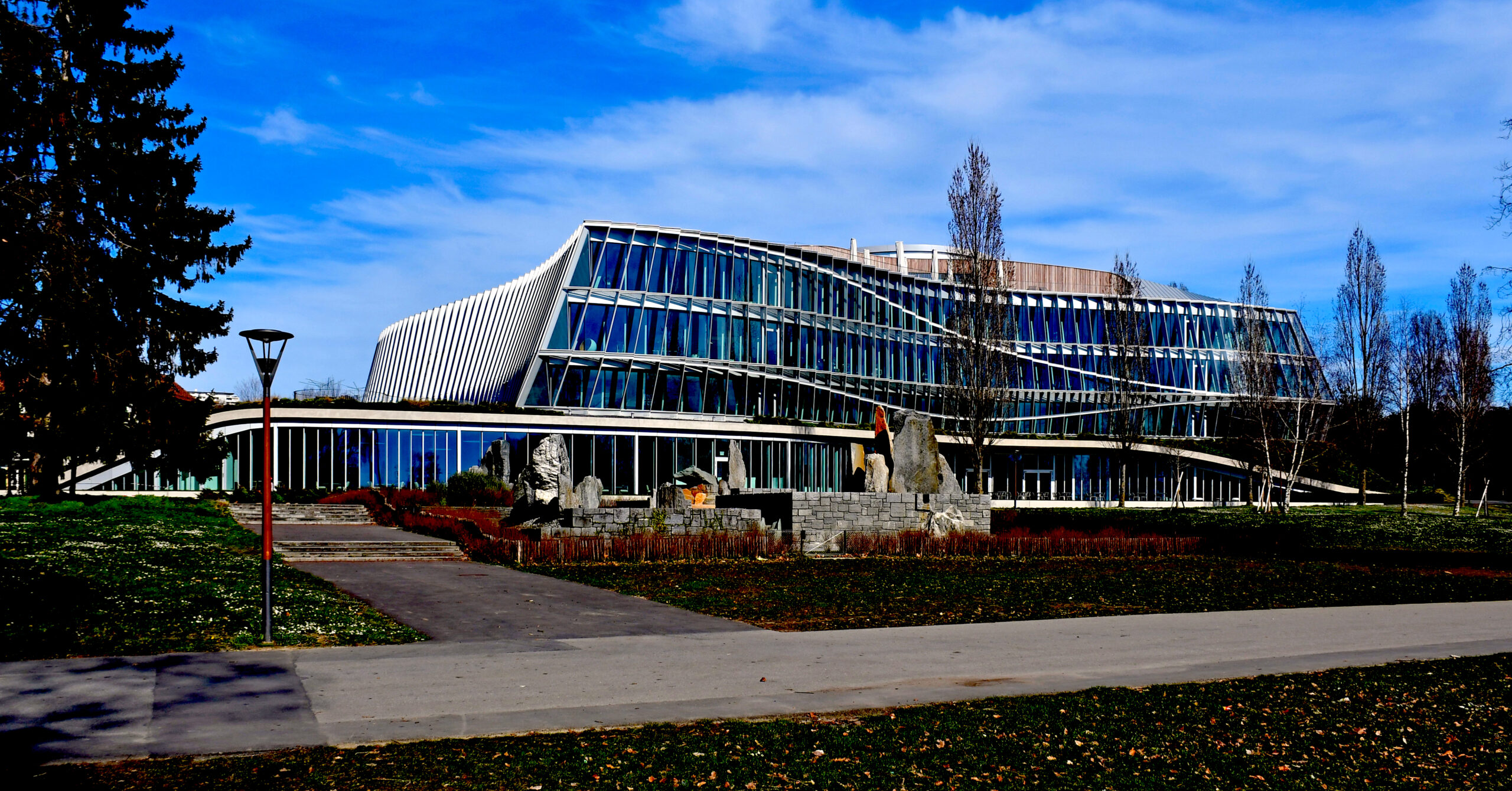
International Olympic Committee headquarters in Lausanne, Switzerland. (Gzzz, CC BY-SA 4.0, Wikimedia Commons)
Interestingly, this two-decade hiatus (which actually amounted to a 28-year absence from the Olympic Games, from 1952 to 1980) saw the two most severe diplomatic incidents surrounding the China question at the IOC. Both centered on the KMT regime’s untenable claim to represent the entire Chinese nation as the “Republic of China,” and both ended in bitter defeats for it, even as Beijing was de facto boycotting the entire Olympic movement. In effect, the PRC substituted state-to-state diplomacy — first with the Soviet bloc and then with Western powers after the Sino-Soviet split — for a formal presence within the institutions, closely mirroring its geopolitical strategy.
The first episode occurred in 1959, not long after Dong Shouyi’s acrimonious resignation, when Soviet delegates to the IOC insisted that Taipei’s NOC change its name on the self-evident grounds that it “[could not] possibly supervise sports in mainland China.” The IOC as a whole readily agreed, with even the arch-anticommunist Avery Brundage reluctantly assenting.
The U.S. mainstream press exploded in outrage; absurdly, Brundage himself was deluged with hate mail alleging he had succumbed to “communist blackmail.” The U.S. State Department called the decision “a clear act of political discrimination” and even President Dwight D. Eisenhower condemned it. The whole affair ended in another embarrassing fudge, with Taipei competing under the name “Taiwan” at Rome 1960 and quietly reverting to “Republic of China” thereafter.
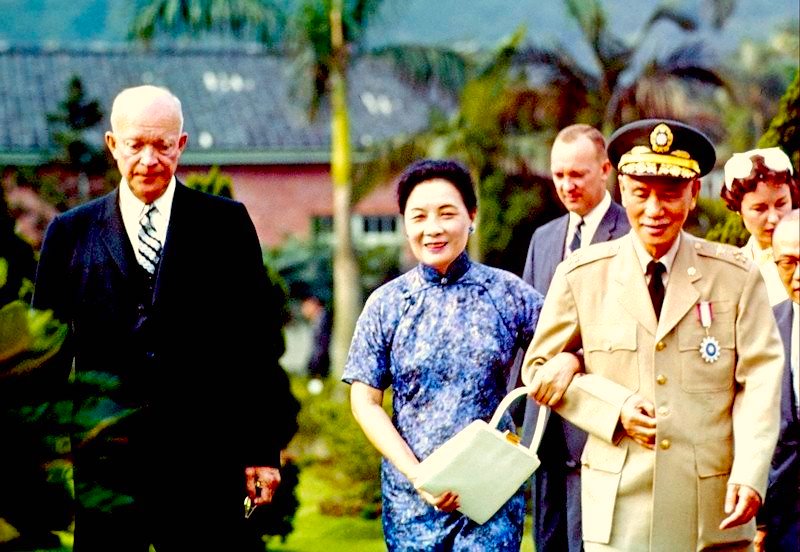
June 1960: President Dwight Eisenhower visits with Republic of China President Chiang Kai-shek and Madame Chiang in Taipei, Taiwan. Also pictured is U.S. Ambassador to Republic of China Everett Drumright. (USAID, Wikimedia Commons)
The second, even more damaging incident took place in the lead-up to the 1976 Montreal Games. After establishing diplomatic relations in 1970, the PRC informed Canada in no uncertain terms that the Taipei NOC should not be allowed to compete as the “Republic of China.” After lobbying earnestly but unsuccessfully for the IOC to recognize Beijing instead of Taipei, Canadian Prime Minister Pierre Trudeau’s government proposed that athletes from Taiwan compete under the neutral Olympic flag. The IOC grudgingly assented at the last minute, but not before debating whether to move the Games to the United States or cancel them entirely; the Taipei NOC ultimately withdrew.
Official reactions from Canada’s domineering southern neighbor were again apoplectic. U.S. President Gerald Ford and the head of the U.S. Olympic Committee seriously discussed the possibility of boycotting or trying to take over the Games at the last minute. This of course did not come to pass, but Canada took a significant reputational hit in the United States — a testament to China’s growing ability to exploit contradictions within the imperialist bloc.
One-China Policy
Canada’s independent China policy under Pierre Trudeau stood in stark contrast with that of his son Justin, who marched in shameful lockstep first with former U.S. President Donald Trump’s judicial kidnapping of Huawei CFO Meng Wanzhou, and now with Biden’s “diplomatic boycott” of Beijing 2022 over exaggerated allegations of human rights abuses in Xinjiang.
Ironically, just a few years after savaging the Canadians, the United States would follow in their footsteps by establishing diplomatic relations with the PRC and (formally) cutting ties with Taipei under the one-China policy.

U.S. President Richard Nixon and Chinese Premier Zhou Enlai toast, Feb. 25, 1972. (White House/Wikimedia Commons)
This paved the way for the IOC to resolve the two-China question later in 1979 in its own unique way: by readmitting Beijing and allowing athletes from Taiwan to compete under the name “Chinese Taipei.” Deng Xiaoping personally approved this compromise in an early foretaste of the future “one country, two systems” settlements that would return Hong Kong and Macao to Chinese sovereignty.
The PRC’s delayed return to the Olympic movement, contingent in many ways on bilateral ties with the United States, contrasted sharply from its triumphant entry into the UN in 1971. On that occasion, an impressive coalition of African and other Third World countries — many fresh from their own national liberation struggles — had secured recognition for Beijing and expulsion of the KMT regime over the strident objections of the United States and most of its allies. By 1979, the basis for unity within the socialist and nonaligned camps had so thoroughly collapsed that China and many other Global South countries readily joined the U.S.-led boycott of the 1980 Moscow Olympics over the Soviet military intervention in Afghanistan.
Instead, mainland China made its long-delayed and triumphant return to Olympic competition at the 1984 Los Angeles Games — remembered locally as an orgy of Reaganite neoliberalism, American jingoism (amplified by the Soviet-led boycott) and militarized police terror that helped create the conditions for the 1992 Rodney King uprising. They nonetheless marked a high point in U.S.-China relations, with PRC athletes being warmly feted by the hosts. This goodwill was not dampened in the slightest when the women’s volleyball team sensationally defeated the hosts to win gold, in one of the most iconic moments of Chinese sports history.
There was ample reason to believe, even after the trauma of the 1989 Tiananmen incident and subsequent U.S. sanctions, that enough of it remained to propel Beijing to victory in its first bid to host the Games. As it turned out, the United States and its allies had no intention of ceding such recognition to a rising China without a fight.
Charles Xu is a member of the Qiao Collective and of the No Cold War collective.
This article is from Peoples Dispatch.
The views expressed are solely those of the author and may or may not reflect those of Consortium News.

Thank you, Charles Xu!
I had no idea that the ugliness of Cold War supremacy and racism also seeped into a sadly politicized olympic competition.
One would have hoped that sports competition would somehow be protected from this ugliness.
I’ve sensed something wrong behind the scenes and pretty much ignored the event for years…one can feel a pulse of commercialization or je ne sais quoi. Good for père, Pierre Trudeau; Shame on fils, Justin.
You have told a fascinating tale that is inspiring because it sheds light for people like me who had no clue and also sad because it shows how deeply embedded the zero sum game ideology of the U.S. and its acolytes are…it’s about them not the efforts of the athletes.
As an outsider to what was really going on, I thought it was petty and stupid for the U.S. to boycott the 2022 Olympics in China.
Who cares whether those officials are there or not. Our athletes competing for the U.S. must be demoralized by this pettiness when they have worked so hard to accomplish their goals and then find their government ignoring their efforts to make a point steeped in hypocrisy.
From this clear historical narrative of China and the Olympics it is quite plain that it is only by dint of the serious ideological commitment of the Chinese leaders if not also the Chinese demographic weight that the PRC has been able to triumph over international imperialistic forces as helmed by the USA. This is also proven by the fact that the other demographic giant India is totally under the thumb of Western imperialism BECAUSE its own upper class leaders are proud of being the reliable slaves of the West to the total dismay of the bulk of the lower caste Indians. So more than a billion strong Indians happily couldn’t deliver even a score of Olympic gold !
The Olympics are a spectacle of world capitalism. Business interests recruit for their country’s teams from all over the world. As even Reuters noted, “The practice of athletes from nations with an abundance of talent – such as Kenya in long-distance running or Brazil in soccer – switching to represent other eligible nations has become an increasing feature of sport” – for the money, of course.
The PRC is an outstanding practitioner of buying global talent for a so-called national team. “Few teams have relied so much on foreign talent the way China’s men’s hockey squad has with a 25-man roster that includes just six homegrown nationals, the remaining players coming from Canada (11), United States (7) and Russia (1).” hXXps://www.reuters.com/lifestyle/sports/familiar-faces-unfamiliar-names-china-takes-ice-2022-02-01/
Progressives do not wallow in the cross-currents of nationalism swirling around Eileen Gu. The PRC made whatever arrangement with Gu in order to complete a bargain. On other hand, when someone with dual citizenship displeases the government, we find, for example, “Cheng Lei, an Australian citizen and high-profile anchor on Chinese state television was detained in China.” hXXps://www.reuters.com/article/us-australia-china-journalists/china-says-australian-embassy-obstructed-law-enforcement-in-case-of-evacuated-journalists-idUSKBN26118U
She gets no Australian consular aid while she is disappeared, as any Chinese citizen can be, even tennis star Peng Shuai.
Given what has transpired recently with Mikela Valieva , the dubious circumstances of her positive test in Dec.2021 and clean test
thereafter , the US is still at it it seems ,in demonizing China and also Russian athletes .
Thank you for the history of China and the Olimpics .
Article magnifique! fort enrichissant! Un article référence extra!
Thanks, that was very interesting. Good for China